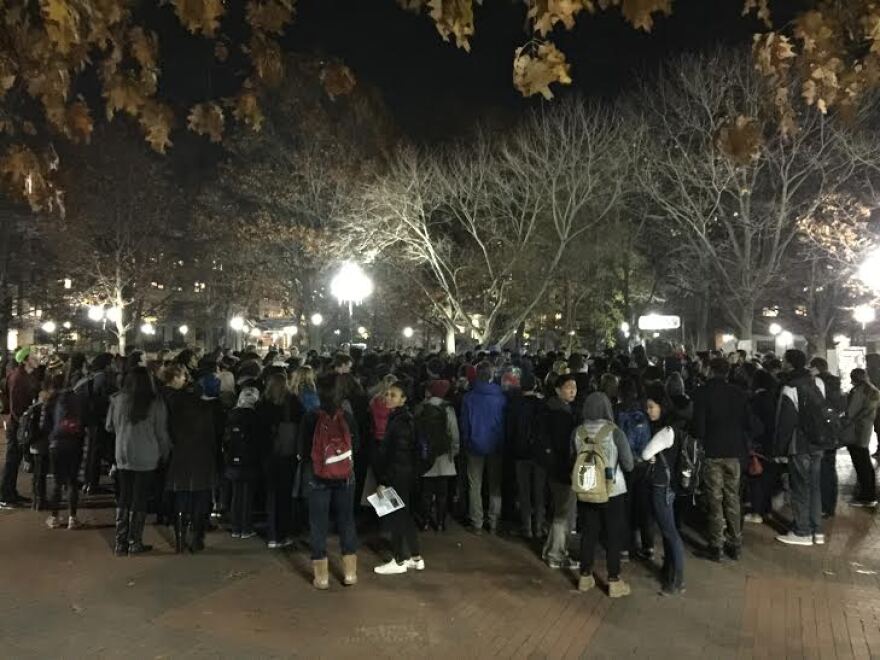A couple hundred University of Michigan students came out to central campus Wednesday evening in a passionate show of support for protesters at the University of Missouri.
As the crowd grew, one organizer from the U of M School of Social Work said black students at the University of Michigan can empathize with the experiences, and the feelings of frustration and isolation, that Mizzou students are voicing.
In a campus of some 40,000 students, just 4% of U of M students are black.
“Four percent!” the organizer shouted. “Four percent!” several crowd members echoed.
“So come tell people why you are here,” the organizer asked, before handing the mic to members of the crowd who wanted to speak.
“My name is Channing Matthews, and I have to say I’m here because you need faculty who look like me!” said Matthews, a graduate student in Education and Psychology.
“And I am not going to give up my journey because somebody says I shouldn’t be there. You need a faculty that looks like me, that looks like students of color that are standing all around me. You need to see us in academia, because our voices aren’t heard enough,” Matthews said.
Rebecca Ahmad-Robinson, a graduate student dually enrolled in the School of Social Work and the School of Public Health, spoke about encountering racism in the classroom.

“My biggest thing was sitting in social work classes feeling like I was losing my f---ing mind,” Ahmad-Robinson said. “I had a white professor … she went and was like, ‘I had this black woman client, she was in poverty,’ and she goes and she mimicked her voice. She did a black woman voice. And I was like, what the f---? And that happens so regularly … it’s actually ridiculous.”
Theo Nobles, a sophomore, said he regularly gets asked why he decided to attend the University of Michigan.
“I got people around me asking why I decided to go to a predominantly white institution rather than a historically black college every single day,” Nobles said. “I’m sure the people over at the University of Missouri that look just like me, get asked that question every single day. But I’m OK with that. I’m OK with being here at Michigan. Because I know that being here is going to make a difference. I’m going to grab my education, so that my children don’t have to deal with this s--- anymore.”
Chelsie “Phancie” Thompson spoke about being at a party where she heard a “white girl saying, ‘What are all these n-words doing here?’ I didn’t know what to do in that situation. I couldn’t say anything.”

Thompson praised one of her professors for talking in class about the protests at the University of Missouri. When the president of that university did resign, she says she was shocked.
“I didn’t believe that he was going to step down, because of the experiences I went through here. I thought the president was going to keep his job, because in my head, that’s how the world works.”
Tanisha Steverson, a senior majoring in anthropology and screen arts, said she was glad that students were rallying together – but she’s tired of having to explain why she’s at the University of Michigan.
“I think it’s kind of crazy that we stand here, and we have to say why we are here,” Steverson said. “You know, white people don’t have to come to any space and say ‘I’m here because…’ Because we know why you’re here. Why do we have to explain ourselves? I feel like that’s something we have to ask ourselves every day. When we get up and we go to class, and we see something racist, we want to explain ourselves. We feel like we have to prove that’s not who we are … and it’s really sad that we have to tell people that.”
The University of Michigan just wrapped up a weeks-long summit on diversity on campus, including a “community assembly” this week to talk about diversity goals.





